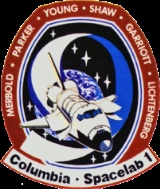
STS-41-B
Encyclopedia
STS-41-B was the tenth NASA
Space Shuttle
mission, launching on 3 February 1984 and landing on 11 February. It was the fourth flight of the Space Shuttle Challenger
. Following STS-9
, the flight numbering system for the Space Shuttle program was changed. Thus, the next flight, instead of being designated STS-11, became STS 41-B; the original successor to STS-9, STS-10, was cancelled due to payload delays.
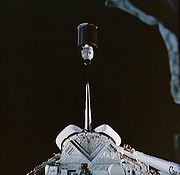
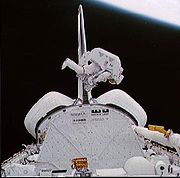
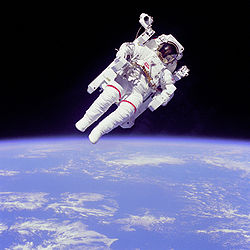
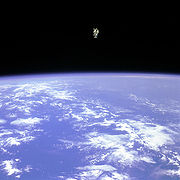 Challenger lifted off from Kennedy Space Center
Challenger lifted off from Kennedy Space Center
at 8 am EST on 3 February 1984. Two communications satellites were deployed about 8 hours after launch; one, WESTAR
, was for Western Union
, and the other, Palapa B-2, for Indonesia
. However, the Payload Assist Module
s (PAM) for both satellites malfunctioned, placing them into a lower-than-planned orbit. Both satellites were retrieved successfully the following November, during STS-51-A
, by the orbiter Discovery
.
The STS 41-B crew included commander Vance D. Brand
, making his second Shuttle flight; pilot Robert L. Gibson
; and mission specialists Bruce McCandless II
, Ronald E. McNair and Robert L. Stewart
.
On the fourth day of the mission, astronauts McCandless and Stewart performed the first untethered spacewalk, operating the Manned Maneuvering Unit
(MMU) for the first time. McCandless, the first human Earth-orbiting satellite, ventured out 320 feet (97.5 m) from the orbiter, while Stewart tested the "work station" foot restraint at the end of the Remote Manipulator System. On the seventh day of the mission, both astronauts performed an EVA
to practice capture procedures for the Solar Maximum Mission satellite retrieval and repair operation, which was planned for the next mission, STS-41-C
.
STS 41-B also achieved the reflight of the West German
-sponsored SPAS-l pallet/satellite, which had originally flown on STS-7
. This time, however, it remained in the payload bay due to an electrical problem in the RMS. The mission also carried five GAS
canisters, six live rat
s in the middeck area, a Cinema-360 camera and a continuation of the Continuous Flow Electrophoresis System and Monodisperse Latex Reactor experiments.
The 7-day, 23-hour, 15-minute, 55-second flight ended on 11 February 1984, at 7:15 am EST; at Kennedy Space Center's Shuttle Landing Facility – the first landing of a spacecraft at its launch site. The uncredited landing of STS-41-B is shown at the beginning of the IMAX
documentary The Dream is Alive
. During STS-41-B, Challenger completed 127 orbits and traveled 2.8 million miles.
, the eleven stars in the blue field symbolize the mission's original designation as STS-11. The left panel shows the deployment of a satellite, and the right panel shows an astronaut using the Manned Maneuvering Unit.
. Each track is specially chosen, often by the astronauts' families, and usually has a special meaning to an individual member of the crew, or is applicable to their daily activities.
NASA
The National Aeronautics and Space Administration is the agency of the United States government that is responsible for the nation's civilian space program and for aeronautics and aerospace research...
Space Shuttle
Space Shuttle
The Space Shuttle was a manned orbital rocket and spacecraft system operated by NASA on 135 missions from 1981 to 2011. The system combined rocket launch, orbital spacecraft, and re-entry spaceplane with modular add-ons...
mission, launching on 3 February 1984 and landing on 11 February. It was the fourth flight of the Space Shuttle Challenger
Space Shuttle Challenger
Space Shuttle Challenger was NASA's second Space Shuttle orbiter to be put into service, Columbia having been the first. The shuttle was built by Rockwell International's Space Transportation Systems Division in Downey, California...
. Following STS-9
STS-9
STS-9 was a NASA Space Shuttle mission which carried the first Spacelab module into orbit to conduct space-based scientific experiments. It was the sixth mission of the Space Shuttle Columbia, and was Columbia's last flight until STS-61-C in January 1986...
, the flight numbering system for the Space Shuttle program was changed. Thus, the next flight, instead of being designated STS-11, became STS 41-B; the original successor to STS-9, STS-10, was cancelled due to payload delays.
Crew
Mission parameters
- MassMassMass can be defined as a quantitive measure of the resistance an object has to change in its velocity.In physics, mass commonly refers to any of the following three properties of matter, which have been shown experimentally to be equivalent:...
:- Orbiter liftoff: 250452 lbs
- Orbiter landing: 201238 lbs
- Payload: 49214 lbs
- PerigeePerigeePerigee is the point at which an object makes its closest approach to the Earth.. Often the term is used in a broader sense to define the point in an orbit where the orbiting body is closest to the body it orbits. The opposite is the apogee, the farthest or highest point.The Greek prefix "peri"...
: 166 nautical miles (307.4 km) - Apogee: 171 nautical miles (316.7 km)
- InclinationInclinationInclination in general is the angle between a reference plane and another plane or axis of direction.-Orbits:The inclination is one of the six orbital parameters describing the shape and orientation of a celestial orbit...
: 28.5° - PeriodOrbital periodThe orbital period is the time taken for a given object to make one complete orbit about another object.When mentioned without further qualification in astronomy this refers to the sidereal period of an astronomical object, which is calculated with respect to the stars.There are several kinds of...
: 90.8 min
Spacewalks
- McCandless and Stewart – EVA 1
- EVA 1 Start: 7 February 1984
- EVA 1 End: 7 February 1984
- Duration: 5 hours, 55 minutes
- McCandless and Stewart – EVA 2
- EVA 2 Start: 9 February 1984
- EVA 2 End: 9 February 1984
- Duration: 6 hours, 17 minutes
Mission summary




Kennedy Space Center
The John F. Kennedy Space Center is the NASA installation that has been the launch site for every United States human space flight since 1968. Although such flights are currently on hiatus, KSC continues to manage and operate unmanned rocket launch facilities for America's civilian space program...
at 8 am EST on 3 February 1984. Two communications satellites were deployed about 8 hours after launch; one, WESTAR
Westar
Westar was the name for the fleet of geosynchronous communications satellites operating in the C band which were launched by Western Union from 1974 to 1984. There were seven Westar satellites in all, with five of them launched and operating under the Westar name.In many international recognized...
, was for Western Union
Western Union
The Western Union Company is a financial services and communications company based in the United States. Its North American headquarters is in Englewood, Colorado. Up until 2006, Western Union was the best-known U.S...
, and the other, Palapa B-2, for Indonesia
Indonesia
Indonesia , officially the Republic of Indonesia , is a country in Southeast Asia and Oceania. Indonesia is an archipelago comprising approximately 13,000 islands. It has 33 provinces with over 238 million people, and is the world's fourth most populous country. Indonesia is a republic, with an...
. However, the Payload Assist Module
Payload Assist Module
frame|PAM-D with the [[Phoenix |Phoenix]] spacecraft. The [[Star 48|Star 48-B]] engine is shown being spun, fired, [[Yo-yo de-spin|yo-yo de-spun]] and jettisoned.thumb|SBS-3 satellite with PAM-D stage inside the space shuttle...
s (PAM) for both satellites malfunctioned, placing them into a lower-than-planned orbit. Both satellites were retrieved successfully the following November, during STS-51-A
STS-51-A
STS-51-A was the second flight of Space Shuttle Discovery, and the 14th flight of NASA's Space Shuttle program. The mission launched from Kennedy Space Center on 8 November 1984, and landed just under eight days later on 16 November....
, by the orbiter Discovery
Space Shuttle Discovery
Space Shuttle Discovery is one of the retired orbiters of the Space Shuttle program of NASA, the space agency of the United States, and was operational from its maiden flight, STS-41-D on August 30, 1984, until its final landing during STS-133 on March 9, 2011...
.
The STS 41-B crew included commander Vance D. Brand
Vance D. Brand
Vance DeVoe Brand is an engineer and former test pilot and NASA astronaut. He served as command module pilot during the first U.S.-Soviet joint space flight in 1975, and as commander of three space shuttle missions....
, making his second Shuttle flight; pilot Robert L. Gibson
Robert L. Gibson
Robert Lee "Hoot" Gibson is a retired Captain and Naval Aviator in the United States Navy and a retired NASA astronaut.-Personal:...
; and mission specialists Bruce McCandless II
Bruce McCandless II
Bruce McCandless II is a former naval aviator with the United States Navy and former NASA astronaut. During the first of his two Space Shuttle missions he made the first ever untethered free flight, using the Manned Maneuvering Unit.-Education:McCandless is the son of Bruce McCandless, a decorated...
, Ronald E. McNair and Robert L. Stewart
Robert L. Stewart
Robert Lee Stewart is a retired Brigadier General of the United States Army and former NASA astronaut.-Personal:Stewart was born August 13, 1942, in Washington, D.C.. He graduated from Hattiesburg High School, Hattiesburg, Mississippi, in 1960...
.
On the fourth day of the mission, astronauts McCandless and Stewart performed the first untethered spacewalk, operating the Manned Maneuvering Unit
Manned Maneuvering Unit
The Manned Maneuvering Unit is an astronaut propulsion unit which was used by NASA on three space shuttle missions in 1984. The MMU allowed the astronauts to perform untethered EVA spacewalks at a distance from the shuttle. The MMU was used in practice to retrieve a pair of faulty communications...
(MMU) for the first time. McCandless, the first human Earth-orbiting satellite, ventured out 320 feet (97.5 m) from the orbiter, while Stewart tested the "work station" foot restraint at the end of the Remote Manipulator System. On the seventh day of the mission, both astronauts performed an EVA
Extra-vehicular activity
Extra-vehicular activity is work done by an astronaut away from the Earth, and outside of a spacecraft. The term most commonly applies to an EVA made outside a craft orbiting Earth , but also applies to an EVA made on the surface of the Moon...
to practice capture procedures for the Solar Maximum Mission satellite retrieval and repair operation, which was planned for the next mission, STS-41-C
STS-41-C
STS-41-C was NASA's 11th Space Shuttle mission, and the fifth mission of Space Shuttle Challenger. The launch on 6 April 1984 was the first direct ascent trajectory for a shuttle mission...
.
STS 41-B also achieved the reflight of the West German
West Germany
West Germany is the common English, but not official, name for the Federal Republic of Germany or FRG in the period between its creation in May 1949 to German reunification on 3 October 1990....
-sponsored SPAS-l pallet/satellite, which had originally flown on STS-7
STS-7
STS-7 was a NASA Space Shuttle mission, during which Space Shuttle Challenger deployed several satellites into orbit. The shuttle launched from Kennedy Space Center on 18 June 1983, and landed at Edwards Air Force Base on 24 June. STS-7 was the seventh shuttle mission, and was Challengers second...
. This time, however, it remained in the payload bay due to an electrical problem in the RMS. The mission also carried five GAS
Getaway Special
Getaway Special was a NASA program that offered interested individuals, or groups, opportunities to fly small experiments aboard the Space Shuttle...
canisters, six live rat
Rat
Rats are various medium-sized, long-tailed rodents of the superfamily Muroidea. "True rats" are members of the genus Rattus, the most important of which to humans are the black rat, Rattus rattus, and the brown rat, Rattus norvegicus...
s in the middeck area, a Cinema-360 camera and a continuation of the Continuous Flow Electrophoresis System and Monodisperse Latex Reactor experiments.
The 7-day, 23-hour, 15-minute, 55-second flight ended on 11 February 1984, at 7:15 am EST; at Kennedy Space Center's Shuttle Landing Facility – the first landing of a spacecraft at its launch site. The uncredited landing of STS-41-B is shown at the beginning of the IMAX
IMAX
IMAX is a motion picture film format and a set of proprietary cinema projection standards created by the Canadian company IMAX Corporation. IMAX has the capacity to record and display images of far greater size and resolution than conventional film systems...
documentary The Dream is Alive
The Dream Is Alive
The Dream is Alive is an IMAX movie, released in June 1985, about NASA's Space Shuttle program. The film was narrated by Walter Cronkite, and directed by Graeme Ferguson.-Synopsis:...
. During STS-41-B, Challenger completed 127 orbits and traveled 2.8 million miles.
Mission insignia
Designed by artist Robert McCallRobert McCall (artist)
Robert McCall was a conceptual artist, known particularly for his works of space art. McCall was an illustrator for Life magazine in the 1960s, created promotional artwork for Stanley Kubrick's film 2001: A Space Odyssey and Richard Fleischer's production Tora! Tora! Tora! and worked as an artist...
, the eleven stars in the blue field symbolize the mission's original designation as STS-11. The left panel shows the deployment of a satellite, and the right panel shows an astronaut using the Manned Maneuvering Unit.
Wake-up calls
NASA began a tradition of playing music to astronauts during the Gemini program, and first used music to wake up a flight crew during Apollo 15Apollo 15
Apollo 15 was the ninth manned mission in the American Apollo space program, the fourth to land on the Moon and the eighth successful manned mission. It was the first of what were termed "J missions", long duration stays on the Moon with a greater focus on science than had been possible on previous...
. Each track is specially chosen, often by the astronauts' families, and usually has a special meaning to an individual member of the crew, or is applicable to their daily activities.
| Flight Day | Song | Artist/Composer | Played for |
|---|---|---|---|
| Day 2 | garbled during broadcast, title unknown | Contraband | Ron McNair |
| Day 3 | "A Train" | Contraband | |
| Day 4 | "Glory, Glory, Colorado" | the University of Colorado Band University of Colorado at Boulder The University of Colorado Boulder is a public research university located in Boulder, Colorado... |
Vance Brand |
| Day 5 | "Armed Forces Medley" | ||
| Day 6 | "North Carolina A&T University alma mater" "Southern Mississippi to the Top Southern Mississippi To The Top "Southern Miss To The Top" is the official fight song of the University of Southern Mississippi. It was penned in 1955 by Robert Hays, the assistant director of "The Pride of Mississippi Marching Band".... " |
Ron McNair Robert L. Stewart Robert L. Stewart Robert Lee Stewart is a retired Brigadier General of the United States Army and former NASA astronaut.-Personal:Stewart was born August 13, 1942, in Washington, D.C.. He graduated from Hattiesburg High School, Hattiesburg, Mississippi, in 1960... |
|
| Day 7 | "Theme from The Greatest American Hero The Greatest American Hero The Greatest American Hero is an American comedy-drama television series that aired for three seasons from 1981 to 1983 on ABC. Created by producer Stephen J. Cannell, it premiered as a two-hour movie pilot on March 18, 1981... " |
||
| Day 8 | "The Air Force Song" | Air Force CAPCOMs | |
| Day 9 | "In the Mood In the Mood "In the Mood" is a big band era #1 hit recorded by American bandleader Glenn Miller. Joe Garland and Andy Razaf arranged "In the Mood" in 1937-1939 using a previously existing main theme composed by Glenn Miller before the start of the 1930s... " |
Contraband |
See also
- SpaceflightSpaceflightSpaceflight is the act of travelling into or through outer space. Spaceflight can occur with spacecraft which may, or may not, have humans on board. Examples of human spaceflight include the Russian Soyuz program, the U.S. Space shuttle program, as well as the ongoing International Space Station...
- Space Shuttle programSpace Shuttle programNASA's Space Shuttle program, officially called Space Transportation System , was the United States government's manned launch vehicle program from 1981 to 2011...
- List of space shuttle missions
- List of spacewalks and moonwalks
- List of human spaceflights chronologically

